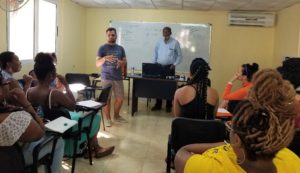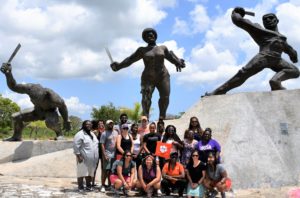Clemson’s first-ever study abroad trip to Cuba demonstrates the importance of tourism to the country’s economy and culture
Last month, a group of students led by Clemson University Parks, Recreation and Tourism Management (PRTM) faculty member Dr. Lauren Duffy and the Director of Diversity and Inclusion at the Gantt Multicultural Center, Dr. Kendra Stewart-Tillman, took part in Clemson’s first-ever study abroad program in Cuba.

The program studied the intersections of tourism and society, from the historic to the modern, and applied a critical lens to how the travel and tourism industry interfaced with social structures and norms that influence daily life for many Cubans, such as race, gender, class, and sexual orientation.
Lauren feels this study abroad program was particularly timely, as it allowed students to see first-hand the impact tourism can have on a society. “In Cuba, tourism is an important industry sector, and the country is largely dependent on revenue from inbound travelers,” she says.
The visit came during a period of instability between Cuba and the U.S., with political issues including increased travel restrictions and a drawback from a once thawing relationship. Lauren says that these challenges, combined with political unrest in allying countries, has resulted in an economic downturn in Cuba, with food shortages in key household items, such as meat, eggs, and flour. “Being in Cuba during these events gave students valuable insight into both the impact tourism can have on a country’s economy, infrastructure, quality of life, and culture, as well as how intertwined Cuba-U.S. relations have been historically,” she says. “It also allowed students to critically challenge popular narratives regarding this relationship.”

Before they left for the trip, students studied the history of travel and tourism in Cuba, and socio-political considerations. This ensured students had the background they needed to be able to assess the current state of tourism, while also considering how it has been shaped by a history of colonialism, slavery, racism, and gender ideology.
“Understanding a country’s past and how it impacts its present and future state helps students apply a different lens to their travel experience,” Lauren continues. “When you understand a country’s history and heritage, you are better equipped to understand how key tourism topics such as conservation, preservation, and economic impact cannot be addressed with one-size-fits-all solutions.”
While in Cuba, the students experienced the country’s rich Afro-Cuban heritage, with visits to colonial, pre-Revolution, and post-Revolution interpretative sites. Discussions with guest speakers through the Center for José Martí Studies helped students unpack the complexities of living in a socialist country with an evolving mixed-economy that is largely spurred by growth of private sector enterprises within tourism – a change that has allowed for a classist society to re-emerge within Havana.
The program was developed through a partnership between the Gantt Multicultural Center and PRTM, with scholarship support being provided by the Gantt Center to increase underrepresented student participation in study abroad programs.
“We were able to support several students as the inaugural cohort of Gantt Study Abroad Fellows, which provided funding assistance for underrepresented student populations that do not typically study abroad at high rates,” said Stewart-Tillman. “This was the first time Clemson sponsored a trip to Cuba and we hope this becomes a regular opportunity for our students in the future.”
